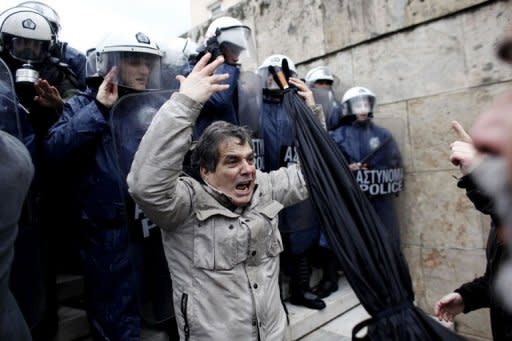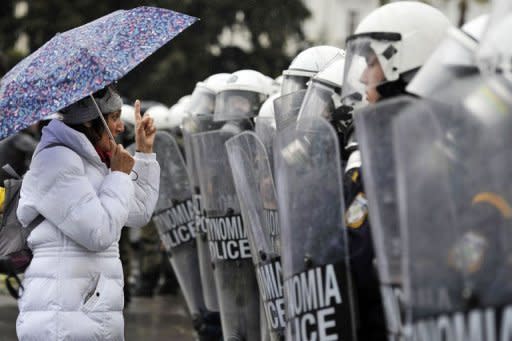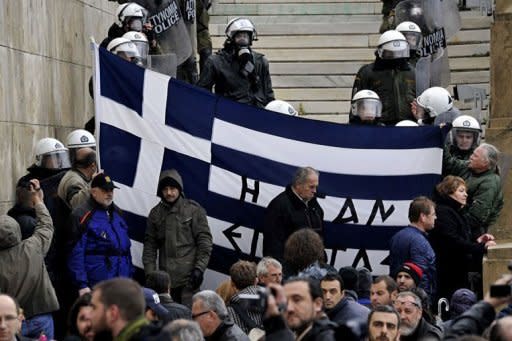Greece protesters vent anger as EU ups pressure
Greeks angered at wage and pension cuts being imposed on their country burned a German flag on Tuesday, with government talks on approving the terms of the bailout dragging into another day. With the country in the grips of a general strike, scuffles broke out on Syntagma Square in central Athens where thousands of protesters braved rain to vent their anger at the EU and International Monetary Fund and at what they saw as a hard line spearheaded by Germany. A group of nationalist protesters burned a German flag and began to set fire to one that showed the Nazi swastika, before riot police swooped in. The country is rapidly running out of time to agree new budget action and to conclude a debt write-off with banks needed to secure a second rescue package and avoid default next month. But Prime Minister Lucas Papademos, caught between conflicting pressures for the soul and solvency of the nation, was forced to postpone again a meeting with leaders of his coalition parties to back the terms of the deal. The new delay of the meeting originally planned for Monday "does not indicate any snag, nothing dramatic has happened, just a series of very technical points that have taken longer resolve than foreseen," said a source in the prime minister's office. Before a meeting with leaders of the three parties backing his transition government, "probably at midday", Papademos still has to finalise with representatives of the EU, ECB and IMF the text on Greece's obligations under a promised second bailout worth 130 billion euros ($170 billion). Earlier Tuesday the prime minister met Charles Dallara, head of the Institute of International Finance and chief representative in the debt write-off negotiations that aim to cut 100 billion euros off Greece's debt. Athens is under intense pressure from European Union leaders, with talk emerging again of Greece's exit from the eurozone. A Greek exit from the eurozone now would be less risky than if it had happened in early-2010 when the scale of its debt crisis first became apparent, Dutch Prime Minister Mark Rutte told Netherlands public radio. "There is less risk now," Rutte told an increasingly eurosceptic Dutch audience. "It is in our interest that Greece remain -- and to achieve that it must do all it has promised to do... but if that does not work out, then we are stronger now than a year and a half ago," he added. Rutte was expressing sympathy for the view put forward by a senior European Commissioner, Dutchwoman Neelie Kroes. She told a Dutch newspaper she was not in favour of Athens going back to the drachma, but said a Greek departure from the monetary union would not be a disaster. "It is not a train crash if someone leaves the eurozone," the EU commissioner for the digital economy told De Volkskrant newspaper. But EU Commission President Jose Manuel Barroso stressed that Greece's place was in the eurozone. "We want Greece in the euro," Barroso told reporters in Brussels. Greece must pay back 14.5 billion euros in bonds due March 20, but without the debt writedown and new bailout aid it would default, which could roil the 17-nation eurozone and undercut a global economic recovery. An EU diplomatic source suggested all was not lost and that negotiators hoped talks would be wrapped up by Wednesday. The EU source said that eurozone finance ministers had been asked to be on standby for talks, probably via teleconference, late on Wednesday or Thursday. Before the scuffles in Athens, demonstrators marched under banners that read: "No to public sector layoffs!", "No to cutting the minimum wage!" "We're here because we'll be among the first in the next batch of 15,000 to be laid off," said Vassilis Bakalis, 34, a curator at the Byzantine and Christian Museum in Athens. Schools, ministries, hospitals and banks operated with skeleton services. Commuters using buses and metros faced major delays in Athens. Air travel was expected to be unaffected however. Yiannis Panagopoulos, leader of the GSEE union, has described the measures, aimed at slashing wages further by 20-30 percent, as a "death sentence" for the country. Pensions would also get chopped and 15,000 public sector employees lose their jobs. Greek media also gave voice to the anguish. "Sacrifices with salary and pension cuts," the daily Ethnos said. Daily Kathimerini wrote the country was being choked by "Merkel and Sarkozy", referring to the German and French leaders who have talked tough towards Athens in recent days. In Paris on Monday, German Chancellor Angela Merkel and French President Nicolas Sarkozy ramped up the pressure on Athens. Merkel warned that Greece would receive no more EU aid until Athens reaches a deal with the EU, European Central Bank (ECB) and IMF on more spending cuts and reforms. Before the second bailout goes ahead Greece's private creditors are first being asked to write off about half of the 200 billion euros' worth of Greek government debt they hold to cut the country's total debt burden down to what is seen as a sustainable level of 120 percent of GDP in 2020 from 160 percent at present.




